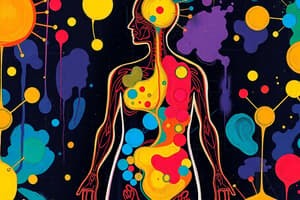Podcast
Questions and Answers
In chemistry, to be classified as an organic substance, a substance must contain?
In chemistry, to be classified as an organic substance, a substance must contain?
carbon atoms
Which element does not contain any neutrons?
Which element does not contain any neutrons?
hydrogen
The chemical formula of a compound describes the elements the compound contains and the...?
The chemical formula of a compound describes the elements the compound contains and the...?
ratio of elements in the compound
What is the symbol for the hydroxyl ion?
What is the symbol for the hydroxyl ion?
The tympanic membranes are also known as the...?
The tympanic membranes are also known as the...?
Which of the following actions produce a chemical change?
Which of the following actions produce a chemical change?
Choking is prevented by the...?
Choking is prevented by the...?
What do a hydrogen molecule and an oxygen molecule have in common?
What do a hydrogen molecule and an oxygen molecule have in common?
Which of the following is a non-renewable resource?
Which of the following is a non-renewable resource?
A perpetual-motion machine can never be built because it is not possible to eliminate...?
A perpetual-motion machine can never be built because it is not possible to eliminate...?
Which of the following is a renewable resource?
Which of the following is a renewable resource?
When scientists measure a liquid's resistance to flow, they are measuring the liquid's...?
When scientists measure a liquid's resistance to flow, they are measuring the liquid's...?
A lobster grows a new claw...?
A lobster grows a new claw...?
What is a body of mass around a mass?
What is a body of mass around a mass?
Flashcards are hidden until you start studying
Study Notes
Chemistry and Matter
- Organic substances must contain carbon atoms to be classified as organic.
- Hydrogen is the only element with no neutrons in its atomic structure.
- The chemical formula of a compound indicates both the elements present and the ratio of those elements.
Chemical Components
- The hydroxyl ion is represented by the symbol OH+.
- Chemical changes are produced, for example, by adding salt to hot water, altering the composition of the substances involved.
Human Anatomy
- The tympanic membranes, commonly known as ear drums, play a crucial role in hearing.
- Choking is prevented by the epiglottis, which covers the voice box during swallowing to block the airway.
Molecular Comparisons
- A hydrogen molecule and an oxygen molecule share a similar size despite being different elements.
Natural Resources
- Wood is classified as a non-renewable resource due to the time required for its replenishment.
- Peanut oil is an example of a renewable resource derived from plants.
Physics and Engineering
- A perpetual-motion machine cannot be built due to the impossibility of eliminating elasticity in materials.
- Viscosity measures a liquid's resistance to flow, a key characteristic in fluid dynamics.
Biological Processes
- Lobsters can regenerate lost claws, showcasing the biological phenomenon of regeneration.
Astronomy
- A body of mass that orbits another mass is referred to as a satellite, an important concept in both natural and artificial contexts.
Studying That Suits You
Use AI to generate personalized quizzes and flashcards to suit your learning preferences.




